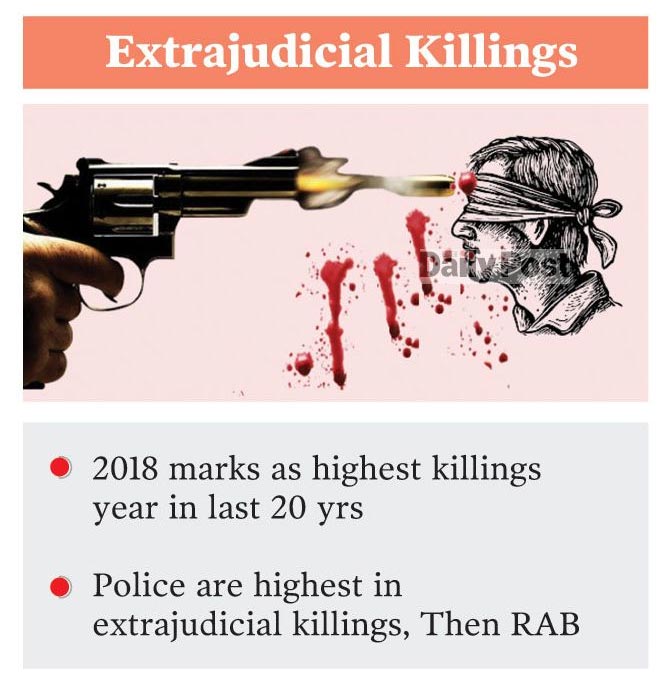-In 2018 marks highest killings in last 20 yrs
- Police are highest in extrajudicial killings, Then RAB
2 thousand 954 people have been victims of this inexcusable murder in the country formally called as extrajudicial killings From 2004 to 2024. This account is from January 2004 to June this year. The human rights organization gave the account to the Ain o Salish Kendra (ASK). ASK monitors such killings on a regular basis. ASK has made this list based on newspaper and own research.
It has been seen that the police, RAB and other law enforcement forces of the government are involved in this extrajudicial killing. Apart from the RAB and police, the forces accused of extrajudicial killings are DB Police, Coast Guard, BGB, Cobra Team and Ansar. According to ASK, the police have the highest number of extrajudicial killings in the last 20 years. Then there is RAB.
Why extrajudicial killings began in 2004?
Rapid Action Battalion (RAB) was formed by the then BNP government in 2004 in the name of law and order control and situation improvement. At that time many, including human rights activists, demanded to transform the police force into a modern and professional force. But that demand was bypassed and elite force called RAB was formed.
Human rights activist Sultana Kamal said that human rights organizations or activists did not immediately express any concern or apprehension about the formation of RAB. But later these forces chose extrajudicial killings in the name of 'crossfire' as the easiest strategy to counter terrorism. The public also expressed some satisfaction as several identified violent terrorists were eliminated in the process. But it was not possible for human rights activists to accept this extrajudicial killing by RAB. Within a year of RAB's formation, the number of people killed in the 'crossfire' exceeded a thousand. Later it increased.
In 2004, when the deteriorating political and social situation in Bangladesh created a sense of insecurity, the then government clearly failed to improve the situation. In that background, the discussion of forming a special powerful force arose inside and outside the government. As a result, RAB was born.
Abu Ahmed Faizul Kabir, senior coordinator of Ain o Salish Kendra (ASK) said, "Since the formation of RAB, the force has been involved in incidents like crossfire and encounter. At one stage the police force is also seen to be involved in such illegal activities. After that, we did not notice any change in the policies taken by the BNP government during the caretaker government; Rather, I saw continuity. Even after the coming of the Awami League government, the forces were not alert; On the contrary, it was very much like preserving the tradition. The killings in the name of the anti-narcotics campaign of the previous government have been noticed a lot.
In 2011, the international human rights organization Amnesty International prepared a report entitled "Unseen Crimes: Extrajudicial Killings in Bangladesh". It said, 'Within months of RAB's formation, RAB's operations became known for a characteristic of murders, which the authorities called "death by crossfire". Extrajudicial killings are evident in many such deaths. It can be seen that after the arrest of the suspect, the murders are taking place in secluded places. Even though there are witnesses to the arrest in some cases, the RAB authorities are adamant about their demands. It said that the victim died in the "crossfire" or "gunfire" or "gunfight". According to ASK's calculations, 2018 saw the highest number of extrajudicial killings in the last 20 years. 412 people were victims of extrajudicial killings that year. Of these, the highest number of incidents occurred at the hands of the police, 216. 135 people were victims of extrajudicial killing by RAB. 17 such killings occurred at the hands of other forces.
On December 10, 2021, the United States imposed sanctions on the Rapid Action Battalion (RAB) and seven officers of the force for alleged serious human rights violations. 188 people were extrajudicial killings in the country that year. But the year after this ban, there were 51 murders. According to ASK's report, the previous fewest extrajudicial killings since 2004 were in 2013, at 42.
Abu Ahmed Faizul Kabir, senior coordinator of ASK, said that since RAB came under US sanctions, such killings have decreased. Maybe the police authorities became cautious after seeing the situation of RAB. Now the question is, how did the forces keep the law and order situation under control without such a crossfire after the ban? So we can say that such killings since 2004 were a strategy of governments to spread fear in the public mind.
In the last 20 years in a social system, the incident of taking away the right to life of so many people is unprecedented. In 2011, the international human rights organization Amnesty International prepared a report entitled "Unseen Crimes: Extrajudicial Killings in Bangladesh". "Such deaths (extrajudicial killings) are usually dismissed as accidental, or RAB officers are said to have died in "crossfire" when they fired in self-defense, the report said. In many cases the victim was killed after being arrested. Despite this, judicial action was never taken after the judicial investigation by RAB or the government in the case of such deaths.
When state forces get involved in such killings, it increases public fear. Common people are insecure.
Sultana Kamal was saying that extrajudicial killings have reached 3000 in these 20 years due to lack of proper accountability. This is highly reprehensible and unacceptable from the point of view of human rights. Both perpetrating and tolerating extrajudicial killings in a humane society are grave crimes against humanity. Extrajudicial killings, deaths in custody, arbitrary detentions and disappearances—these four types of incidents are considered to be the biggest human rights violations. But the National Human Rights Commission has so far investigated only one case of extrajudicial killing.
In February 2014, Jashore's Keshabpur police station conducted the operation. A person named Rajab Ali was killed in the alleged 'gunfight'. After investigating the incident, the National Human Rights Commission called the incident of the gunfight a 'murder'. The commission also identified the inconsistency of the statement of the police with the incident and said that there is no truth in the incident of the alleged gunfight. The commission's investigation resulted in the incident. But that's the first, that's the last investigation.
Abu Ahmed Faizul Kabir believes that now in this changing political background, a field has been created to prosecute extrajudicial killings. He said, if the current government thinks that such killings will be prosecuted, then it should take the initiative of prosecuting all murders because the families of the victims are still living with pain. And the human rights activists of this country have been protesting these murders since the beginning and are still demanding in the hope of redress.
ZH






